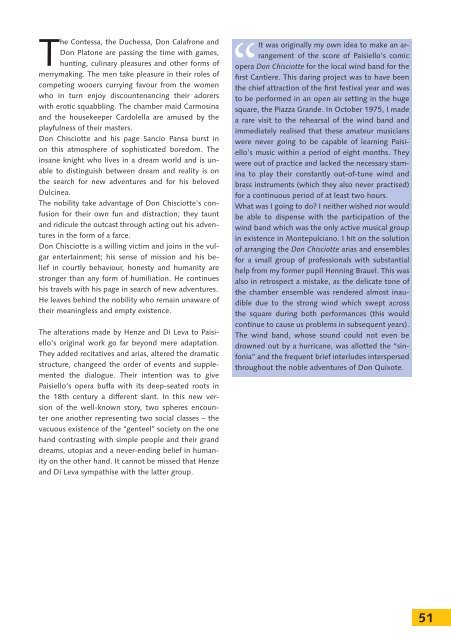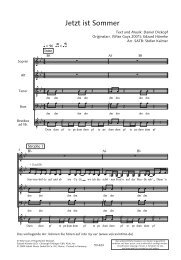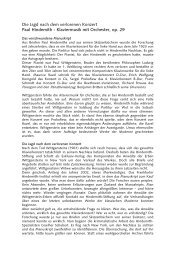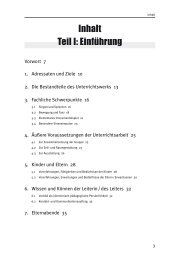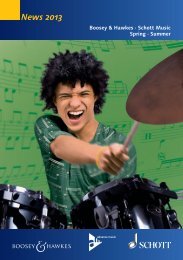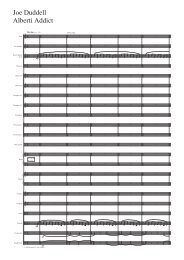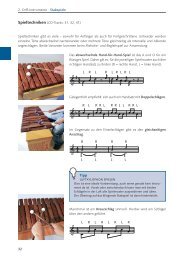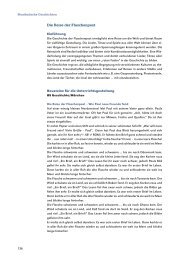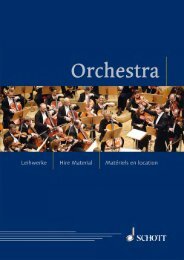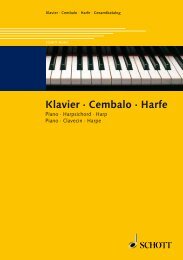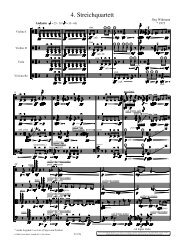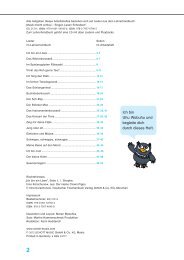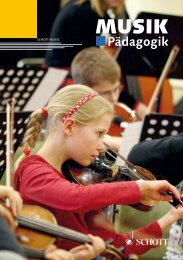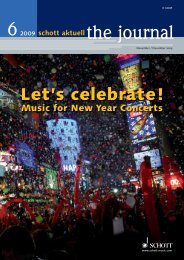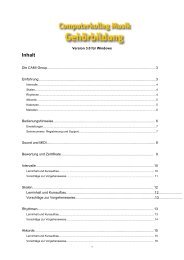HANS WERNER HENZE - Schott Music
HANS WERNER HENZE - Schott Music
HANS WERNER HENZE - Schott Music
Sie wollen auch ein ePaper? Erhöhen Sie die Reichweite Ihrer Titel.
YUMPU macht aus Druck-PDFs automatisch weboptimierte ePaper, die Google liebt.
The Contessa, the Duchessa, Don Calafrone and<br />
Don Platone are passing the time with games,<br />
hunting, culinary pleasures and other forms of<br />
merrymaking. The men take pleasure in their roles of<br />
competing wooers currying favour from the women<br />
who in turn enjoy discountenancing their adorers<br />
with erotic squabbling. The chamber maid Carmosina<br />
and the housekeeper Cardolella are amused by the<br />
playfulness of their masters.<br />
Don Chisciotte and his page Sancio Pansa burst in<br />
on this atmosphere of sophisticated boredom. The<br />
insane knight who lives in a dream world and is unable<br />
to distinguish between dream and reality is on<br />
the search for new adventures and for his beloved<br />
Dulcinea.<br />
The nobility take advantage of Don Chisciotte’s confusion<br />
for their own fun and distraction; they taunt<br />
and ridicule the outcast through acting out his adventures<br />
in the form of a farce.<br />
Don Chisciotte is a willing victim and joins in the vulgar<br />
entertainment; his sense of mission and his belief<br />
in courtly behaviour, honesty and humanity are<br />
stronger than any form of humiliation. He continues<br />
his travels with his page in search of new adventures.<br />
He leaves behind the nobility who remain unaware of<br />
their meaningless and empty existence.<br />
The alterations made by Henze and Di Leva to Paisiello’s<br />
original work go far beyond mere adaptation.<br />
They added recitatives and arias, altered the dramatic<br />
structure, changeed the order of events and supplemented<br />
the dialogue. Their intention was to give<br />
Paisiello’s opera buffa with its deep-seated roots in<br />
the 18th century a different slant. In this new version<br />
of the well-known story, two spheres encounter<br />
one another representing two social classes – the<br />
vacuous existence of the “genteel” society on the one<br />
hand contrasting with simple people and their grand<br />
dreams, utopias and a never-ending belief in humanity<br />
on the other hand. It cannot be missed that Henze<br />
and Di Leva sympathise with the latter group.<br />
“<br />
It was originally my own idea to make an arrangement<br />
of the score of Paisiello’s comic<br />
opera Don Chisciotte for the local wind band for the<br />
first Cantiere. This daring project was to have been<br />
the chief attraction of the first festival year and was<br />
to be performed in an open air setting in the huge<br />
square, the Piazza Grande. In October 1975, I made<br />
a rare visit to the rehearsal of the wind band and<br />
immediately realised that these amateur musicians<br />
were never going to be capable of learning Paisiello’s<br />
music within a period of eight months. They<br />
were out of practice and lacked the necessary stamina<br />
to play their constantly out-of-tune wind and<br />
brass instruments (which they also never practised)<br />
for a continuous period of at least two hours.<br />
What was I going to do? I neither wished nor would<br />
be able to dispense with the participation of the<br />
wind band which was the only active musical group<br />
in existence in Montepulciano. I hit on the solution<br />
of arranging the Don Chisciotte arias and ensembles<br />
for a small group of professionals with substantial<br />
help from my former pupil Henning Brauel. This was<br />
also in retrospect a mistake, as the delicate tone of<br />
the chamber ensemble was rendered almost inaudible<br />
due to the strong wind which swept across<br />
the square during both performances (this would<br />
continue to cause us problems in subsequent years).<br />
The wind band, whose sound could not even be<br />
drowned out by a hurricane, was allotted the “sinfonia”<br />
and the frequent brief interludes interspersed<br />
throughout the noble adventures of Don Quixote.<br />
51


